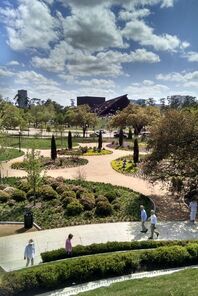 I have always loved the people in the city where I reside. Sure we have our problems as all cities do, but in general folks here are generous, kind, and for the most part, a blessing to one another. Whenever there is a catastrophe Houstonians open their hearts and their arms to help people in need, no matter who they might be.* But even in ordinary situations, it is my experience that conversations with ‘strangers’ are not an unusual occurrence; people are quite friendly. For example, the other day while in a checkout line, the man behind me noticed the peppers I was purchasing and engaged in a conversation about how he loved to roast peppers for his cooking. As I finished my transaction, he smiled and with genuine feeling said, “Have a blessed day!” I responded with “You too,” although what I was thinking was: “Indeed I shall; you have just blessed it.” In retrospect, I wish I had actually said that to him, although I am hopeful that he received the sincerity of my response nonetheless. But it drove home for me that what we do and say does make a difference. Not only did he brighten my day, but he truly blessed me both in the words he offered as we parted and in the friendly ‘welcome’ offered through initiating the short conversation in the first place. There are important lessons here: First, I should have said what was in my heart not only because it was the truth, but because perhaps it would have gladdened his heart more deeply, just as his words had gladdened mine. And second, it underscores the fact that with all the angst and negativity in the world, we definitely need to do much more blessing and a whole lot less cursing. This is not necessarily a reference to our choice of words, though that is also essential to kind interaction; rather, I am referring to our demeanor and the gift we should be to one another. Truly, the world needs more blessings. 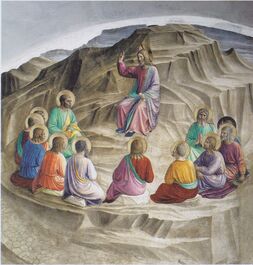 This Sunday was World Mission Sunday, something Pope Francis has spoken about in encouraging evangelization. In fact, the Pope has designated the entire month of October (2019) as Extraordinary Missionary Month. And it should not go unnoticed that the feast of St. Luke the Evangelist is also this month, (October 18), significant because St. Luke was indeed a missionary, given his travels, and that the Gospel he wrote emphasizes the importance of being welcoming to everyone, particularly the outcast, such that they come to know Jesus through offered love and generosity. Luke pointed out that Jesus taught us to be a blessing to one another and to bring blessing to the world through acts of love done without fanfare, but rather with humility and sincerity. At the heart of the message of Jesus is that we love our neighbor as ourselves and that we stretch even further by loving those who are difficult to love. This love includes welcoming the stranger, even if we are in a grocery store checkout line conversing about produce! With every encounter we are to be a blessing to one another, and not a curse. Thus, we become a type of missionary such that we intend to leave others enriched in some way, rather than leaving them worse off, empty, or feeling like they are invisible. And in turn we should receive their welcome with equal sincerity and gratitude. This sort of interaction is how we evangelize: we live the gospel, preaching with our actions, and if we have to, also with our words. ** 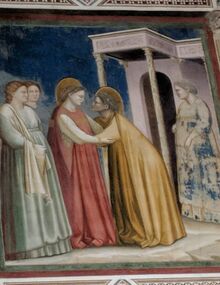 We do not know a lot about St. Luke although there is some information which can be gleaned from the letters of St. Paul as well as what Luke revealed about himself at the beginning of his Gospel. From these we learn that Luke was a physician and that he valued writing in a historically accurate way. He was of pagan Greek origin, but he converted to Christianity after he met Paul, accompanying him on the rest of his missionary journeys. Thus, Luke was a missionary with Paul; of course he ministered to Paul as a physician, but it would be a mistake to characterize Luke as one who wrote but never spoke the message which burned within his heart, especially after spending years with such an outstanding teacher and preacher as St. Paul. In the opening of both his Gospel and the Acts of the Apostles Luke addressed his writing to “Theophilus,” (lover of God). From this we can assume that Luke was writing to a community that was familiar with him, and had therefore heard him preach. And finally, while Luke never met Jesus, there is evidence that he knew Mary, ‘interviewing’ her at length. This would explain why his Gospel contains more about Mary than any other. The detail and intimacy with which he described the Annunciation and the mysteries of the birth of Jesus indicates that he had firsthand knowledge which could only have come from her. 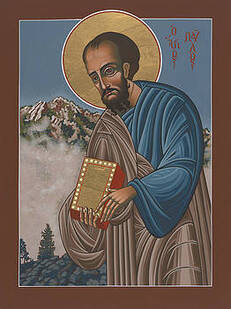 Of the themes of Luke’s Gospel, one which stands out is the inclusiveness of Jesus, whose love was not limited to the Jewish people who were awaiting the Messiah. It is clear from Luke that Jesus put emphasis on His love for the poor, sinners of every type, women, (especially widows), the outcast, lepers, and foreigners (Gentiles); that is, all those people marginalized by the Jewish culture. This Gospel teaches that love is about welcome and being a blessing, so that just as Jesus welcomed everyone, so too should His disciples. It is about opening one’s heart to everyone, not just those who are easy to love, but also the ones who pose the greatest challenge. Thus, all are invited, all are welcomed, and all are loved by God no matter who they are, where they come from, what their background, or what their past history may have been. It is obvious that Luke took to heart the teaching of Paul who said that there was no longer Jew or Greek, man or woman, free or slave, but all were one in Christ. (Gal 3:28) The only way for this to be lived is be intentional in what we say and do, so as to be a blessing to those we meet. 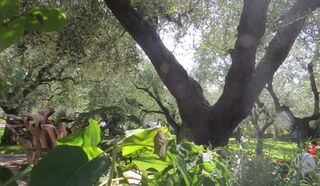 Luke knew, and therefore emphasized, that to be a disciple of Christ we must invite the unwelcomed (Lk 5:27-32), heal the wounded (4:38-41), find the lost (15:1-32), offer peace to the disquieted (4:31-37), forgive those who have wronged us (17:3-4), and offer what we can to the poor (16:19-31). This means we must first accept these gifts of God ourselves so that we can offer them to others. Once we realize the mercy with which we have been forgiven and loved, we will find it easier to welcome others as we have been welcomed. Furthermore, nowhere in the Gospel is anyone ever expected to be perfect. As we have seen, Jesus offered great mercy to the habitual sinner. Luke makes it abundantly clear that perfection is not a criterion for entering the Kingdom of God, and thus it is not required for one to be a disciple.*** However, what is essential is how well we attempt to love our neighbor without distinction: friend, foe, and stranger alike. Clearly, the Gospel is about having an open heart, welcoming all we meet, and being a blessing rather than a curse in whatever setting we may find ourselves. 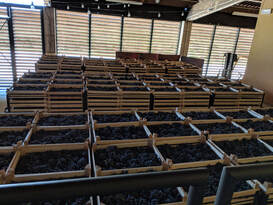 What we learn from Luke, (and from the Church designating World Mission Day), is that we are to be missionaries of blessing here and now; we do not have to travel like Luke or Paul. In fact, before we can go to a far-off land, if that is our call, we must learn to love at home. The effect of all our loving actions, no matter where we are, is real. This means that we are to be a blessing in the little things we do on a daily basis and that if an opportunity presents itself, we should say and do what is in our heart so that we do not regret kind words unspoken or works of mercy undone. The work of blessing does not have to be something outside our ability; it is not about writing a theological masterpiece, but it is about being a missionary of love, which in itself is a theological masterpiece. It is not about spending hours on our knees, but it is about the fruitfulness of our time of prayer leading us to action. It is not about doing miraculous works, but it is about sharing with others and letting love work the ‘miracle.’ It is important to take to heart the message of Jesus that this is our call, offering blessing in place of curse, joy instead of loneliness, and kindness where there may be emptiness. Let us think of ourselves as true disciples, those who are called to act as missionaries of blessing and evangelists of love, just as St. Luke emphasized in his Gospel. This is indeed what Christ asks of those who love Him: it is how we share the Good News to the ends of the earth. 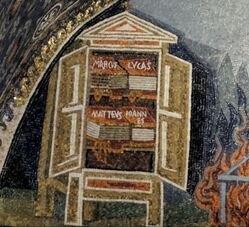 May we take up the call of Jesus as missionaries of blessing and evangelists of love! May we ask for the graces we need to live as true disciples of Jesus! May we take to heart the Gospel of Luke and the emphasis Jesus puts on welcoming all those who are marginalized or outcast! May we spend time in prayer for the needs of the world, to come to know and love Jesus better, and to better recognize the opportunities which come daily to be a missionary of blessing! And may we learn to value with gratitude the kindness, mercy, compassion, peacemaking, justice, generosity, and forgiveness which are offered to us by God so that we in turn, may offer these to others! Let us continue to meet in the heart of Jesus! Peace! ©Michele L. Catanese Notes: This entire blog, Heart Speaks to Heart, is the result of the wisdom and encouragement offered to me by Joanne Knowles, my long time spiritual director and dear friend. She passed away this past week, so while I know she is rejoicing with God and all the holy ones, please pray for the repose of her soul and also for her family. For years Joanne encouraged me to write and she kept a copy of every single blog entry ever posted here! Fittingly, there is an early entry in which I wrote about her. It can be found in my Archives from November 2012, or you can click here: https://www.catanesesd.com/micheles-blog/the-gift-of-an-anam-cara Rest in peace, Anam Cara! Next post November 4 * After disasters in many places around the country and the world, not just here in Houston, Houstonians are quick to share their money, goods, and hard work to help others. It is very impressive and inspiring. During a crisis no one asks about the politics, religion, race, or creed of those who are in need: they help all equally. I must also mention that recently one of our deputies, Sandeep Dhaliwal, (a trailblazer as the first Sikh deputy to wear a turban on duty), a beloved, courageous man who cared deeply for the people of this city, was murdered during a traffic stop. The people of Houston honored him and continue to mourn his loss; another touching example of the love and care of this community. ** This is a paraphrase of a quote often attributed to St. Francis of Assisi as he missioned the friars to serve in the community. *** Read Luke’s writing and count how many times Jesus ate and drank with so-called sinners, put Himself into the presence of a demoniac in order to set him or her free, or healed the servant of an ‘enemy’ (such as the Roman centurion); count how many times He chose to be with those who cheated others such as Levi (Matthew) and Zacchaeus, forgave those who wronged Him, and had patience with those who simply could not understand what He was trying to say (not just the Pharisees, but often the apostles!) Thus it is obvious that He did not seek perfect people, nor did He ask anyone He associated with to be perfect. But He did offer them healing, hope, and the freedom which would start them on the path to holiness, clearly outlining what was expected of those who committed to Him. Images: 1. My photo, taken in Hermann Park, Houston: It seems fitting to use one of the prettiest parks in Houston to highlight my hometown, mentioned in the opening example. 2. Painting, Sermon on the Mount, Blessed Fra Angelico: Bl. Fra Angelico is one of my favorite artists because his works convey a holiness and beauty which I believe is unrivaled. I chose this mostly because Jesus is teaching His disciples not only so they understand His message, but so that they become missionaries of love and blessing through their word and deed. 3. My photo of a fresco, The Visitation by Giotto, located in the Scrovegni Chapel, Padua, Italy: The highlight of a recent trip to northern Italy was the Scrovegni Chapel. If you have followed my blog for any length of time you will have seen that I love Giotto. For many years I had wanted to see the frescoes in person, and it was a blessing, indeed. I chose to use this image because it is of Mary who at the Visitation acted as a missionary of love and blessing to her older cousin Elizabeth. It was as if Mary was 'preaching the gospel' yet unspoken, given that she was still pregnant with Jesus. 4. Icon, St. Paul the Apostle, by Fr. William Hart McNichols: This icon depicts Paul with the gospels, that is, as a missionary who brought the Good News in his many travels, (hence he was evangelizing.) You can find it at https://fineartamerica.com/featured/st-paul-the-apostle-196-william-hart-mcnichols.html 5. My photo, Masi Vineyards, Veneto, Italy: I chose this photo taken within an olive grove because it was a place of beauty and peace. The light streaming through the olive grove and the stump of what seemed to have been an ancient olive tree remaining among the living, vibrant trees conveyed a sense of life and hope. 6. My photo, grapes drying at the Masi Vineyard: These grapes were in the first step of the wine making process. The bounty of the harvest was what struck me. Along with the olives in the previous photo, it seemed to speak of the miracle, if you will, of taking the fruit and crushing it so that it can 'rise to new life' after a period of transformation, (metaphorically and symbolically speaking). This message is the heart of the gospel and it is through our love that we help others in this process of trusting that God is with them and that new life awaits all those who commit to Him. 7. My photo, taken in the baptistery at San Vitale Cathedral, Ravenna, Italy: This is a close-up of part of a huge mosaic. On the left side of the mosaic was this open cabinet with the four books of the Gospels displayed, which you can see if you look closely. It seemed a fitting way to end this entry. NOTE: In compliance with GDPR rules, I wish to make it clear that I do not gather any information on any of my readers at any time.  Having been to Scotland, I know what a lovely country it is. So when I came across a video of an event in Scotland which involved the relics of one of my favorite saints, I had to view it. The video, filmed in Carfin Grotto, (not far from Glasgow), showed people lining the roads in heartfelt veneration as the relics of St. Thérèse of Lisieux were carried in procession and then placed in a special vehicle in order to be brought to another part of the country. The number of people reverently lining the streets was both amazing and wonderful to behold. Seeing this inspired me to reflect upon how people respond to the sacred, especially to those who have lived holy lives: it seems that the saints fascinate us because they give us hope. Perhaps the response in Scotland was because of the goodness of St. Thérèse and her promise to “spend her heaven” interceding for those who were in need, both of which glorify God, not Thérèse. Honoring her remains is a reminder that God works through the love and service of His holy ones. But I also thought about how we should want to be remembered after our own death. To do so is not egotistical or bizarre in any way. We should all think about this because it is, in fact, our call as Christians. Each of us should desire that we would leave the world a better place, a holier place, because we have lived in it. We are meant to build up the Kingdom, and so we should desire to be remembered as those who served the Lord with humility and love. Therefore, it should be part of our reflection and prayer to ask for the graces to live in such a way that when we are gone others will be inspired by our memory and desire to live holy lives, too. And if we are truly growing in holiness, we will not desire any acclaim because we took to heart the teaching of Jesus when He said that “the first will be last and the last will be first” (Mark 10:30); thus our intention will be to glorify God so that others will be attracted to Him via our love and humble service. 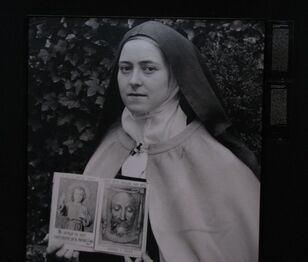 St. Thérèse of Lisieux (1873-1897, feast day October 1) was one who chose to be ‘little.’ As she matured both emotionally and spiritually she realized that her life was about living in service of Jesus. Thérèse came from an upper middle-class family, surrounded by her loving parents and siblings. But as the ‘baby,’ she had been the center of attention for many years, something she relished until she had a painful revelation, after which she cast aside her selfish behavior and focused on pouring her love outward. At only 15, she entered a Carmelite convent, a place of obscurity and poverty, and it did not take long for the other nuns to see that she was filled with great love and holiness. A few years later, when it became clear that Thérèse was terminally ill, her superior had her write her autobiography (The Story of a Soul). Thérèse did so as an act of obedience; she never dreamed it would be published, intending it for her community and nothing more. Without that book the world would never have known one of its greatest saints. Thérèse would have died in obscurity the way she chose to live. But it was her humility and the little acts of love she directed at each and every nun in her community which made her so beloved. In other words, she who was ‘first,’ coming from a comfortable background, had desired to be ‘last,’ (entering into humble service), just as Jesus taught. And in so doing, Thérèse of Lisieux caught the attention of the world as the last who became the first; she viewed herself as little and became one of the most inspiring Saints of all.*  Another who can be described similarly is St. Francis of Assisi (1182-1226, feast day October 4). He, too, was born into a well-off family, though perhaps his was a bit more prominent than that of Thérèse. Also similar is that as a youth Francis was self-indulging: he was haughty and loved partying with his friends, spending money on vanities and the so-called good life. And also like Thérèse, he had a ‘moment of reckoning’ in which he made a complete break with ego and pride, embracing instead humility and poverty. His conversion was a lengthier process than that of Thérèse, but his love for Jesus grew so great that he eventually threw off all of his finery (quite literally), donned a rough garment with a rope belt around his waist, and devoted himself to Lady Poverty and service of Jesus in the poor, especially the lepers. Unlike Thérèse, however, he was a laughing-stock at first; but then Francis become one of the most respected of people, and now, one of the most beloved of Saints. ‘The first’ (the rich powerful one), became ‘the last’ (in poverty and humility), because he chose it. Thus in becoming ‘the last’, he became ‘first’ again, only this time in the estimation of the one who is most important, Jesus the Lord. 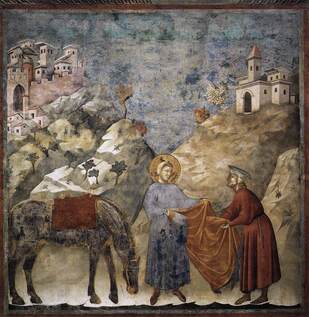 There are many similarities in the stories of these two saints, yet they could not have had personalities that were more different and could not have lived in eras more diverse. However, what they had in common is the thread that binds all the holy ones: Thérèse and Francis each had the desire to serve God, fueled by intense, intimate love for Him which enabled them to become humble and lowly. Thus, both desired poverty and to serve others via the life to which they were called. These two great saints became ‘the first,’ as acclaimed, revered, canonized Saints, when they chose to be ‘the last;’ that is, they chose others over self, little acts of love over grandiose gestures, Christ over honors. Jesus became their wealth, their goal, and their greatest love. In desiring lowliness, they chose to make the lives of others better, Thérèse in her obscure convent, and Francis either working with lepers, evangelizing, or in prayer on Mt. Subiaco. Both sought only Jesus, nothing else; thus they learned to find Him in their own little ways in the ones they served. Both were filled with love which was so evident that after their deaths each were acclaimed and canonized almost instantaneously. As the saying goes, “Cream rises to the top.” The last shall be first.  What we learn from Sts. Francis and Thérèse is that if we desire to be holy, which we should want with all our heart, we should imitate the one thing they both did, and that is to seek to be ‘the last’, not ‘the first.’ If we seek to be ‘the last’ we need to put God before ourselves, desiring to serve Him in our families, with our friends, and especially in the poor, lonely, ill, and marginalized. And we should desire to be remembered after our death as one who lived a holy life, not for the acclaim, – (a lack of humility does not make one holy, it does the opposite) – but because it is what we are called to do, because it glorifies God, and mostly because it is our gift of love to Him. A holy life, and thus a life well lived, is our best gift of gratitude to God. Jesus taught on numerous occasions that seeking the highest position is a fleeting, hollow honor, there is nothing lasting to be gained in it. However, if we choose to be the least, serving as He served, we are His true disciples and we will attain the glory which does last: to share eternity with Him in Heaven. 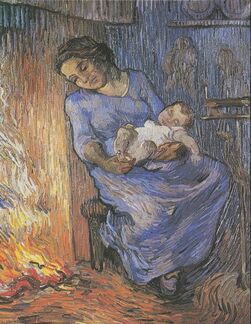 To become the last we need to be like St. Thérèse, with love as our vocation, and like St. Francis who was able to be Christ-like despite what anyone thought of him. These are not impossible dreams to pursue, but with work and discipline, with love as our motivation, we can joyfully choose to be humble, (to be as ‘the last’), so that others may be brought to God. The gospels tell us that if we love our neighbor as ourselves, if we are generous, kind, merciful, strive to serve others, and seek forgiveness when needed, we will grow in holiness. And like Thérèse and Francis we need to be women and men of prayer so that we might grow in intimacy with God and to better recognize His presence when the going gets tough as well as in times of joy. If we live humbly and with the love Jesus taught, everyone we encounter will be left just a bit better and the world a bit holier, because we have lived. Indeed, we should spend time reflecting upon how we want to be remembered after our life is over. And if we seek no honors now, and are willing to serve others even in the smallest, seemingly insignificant ways, we will have imitated Christ and we will have become holy, honored in His sight. If that is your dream and the passion of your heart, then you will be the last who God will invite to be the first.  May we seek to be humble, desiring to live the gospels as Jesus taught! May we be inspired by the saints who made humility, service of others, and love their response to God! May we ask the intercession of St. Thérèse and St. Francis so that we might live holy lives! May we devote our lives to striving for holiness according to the lifestyle to which we have been called! May we eventually leave this life having made the world just a bit better for having lived! And may we live with gratitude for all the graces and gifts given to us by God! Let us continue to meet in the heart of Jesus! Peace! ©Michele L. Catanese Notes: * When I use the terms ‘the first’ and ‘the last’ I am putting them in partial quotes (as is my style) so that we are reminded that I am using the definition of first and last as applied by Jesus in the gospels. He is not speaking as if we are in a race, nor is He implying that we denigrate ourselves. Rather, Jesus is implying 'the last' are those who do not seek honors and who seek to live with humility, serving with love. Those who seek to be ‘the first’ are the haughty: the true ‘first’ are the ones who God honors, that is, the holy ones. To view the video which inspired this post, mentioned in the first paragraph, click here: https://www.facebook.com/sanctafamiliamedia/videos/863612750701716/ Images: 1. My photo, at garden at Direlton Castle, N. Berwick, Scotland: I thought that this would be an appropriate photo to begin since it was in a beautiful garden in Scotland, but also because St. Thérèse of Lisieux is often referred to as "The Little Flower" after a reference she made to herself in her autobiography in which she said that she was a little flower in the garden of the Lord. 2. My photo of a photo, taken in Notre Dame Cathedral, Paris, France (2013): I took this photo while in my second visit to Notre Dame Cathedral. It was part of a permanent collection of photos of St. Thérèse of Lisieux. Unfortunately, I do not know if those original photos survived the recent fire at the Cathedral. 3. Icon, St. Francis Wounded Winter Light, by Fr. William Hart McNichols: This icon shows the humility and chosen poverty of St. Francis of Assisi. He truly was a humble servant of God, the last who became the first, as described by Jesus in the gospels. You can find this icon at https://fineartamerica.com/featured/st-francis-wounded-winter-light-098-william-hart-mcnichols.html 4. Painting, St. Francis Giving His Cloak to a Beggar, Giotto: This painting depicts St. Francis as a young man. The event painted here shows him as his conversion was evolving, so to speak. It was one of his first offerings to the poor, taking place shortly before he left all of his family's wealth behind for good. 5. My photo, a hummingbird on a feeder: I chose this photo because the hummingbird is a tiny bird, humble in size, but amazing to behold. They are almost insignificant in size, yet they are beautiful. It seemed a fitting reminder that the littlest can be great in its own way. 6. Painting, Mother and Child, by Vincent van Gogh: I chose this because it is a humble scene of the security given through the bond of love between the mother and the child, both asleep before the warmth of a fire. There is no finery here, just love. 7. My photo, trees in a park outside of Auckland, New Zealand: I chose this because the (large) tree looked rather luminous. Just as holy people have a kind of luminosity, a radiance often depicted as a halo, so this tree seemed to have a radiance of its own. NOTE: In compliance with GDPR rules, I wish to make it clear that I do not gather any information on any of my readers at any time. |
Heart Speaks to Heart
|

 RSS Feed
RSS Feed

